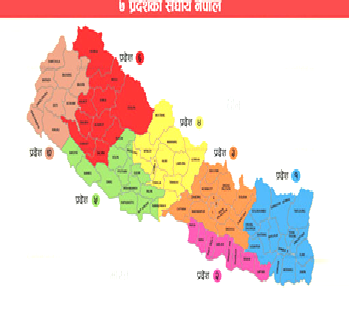New government system and environmental issues


With the adoption of a federal structure of governance envisaged in the new Constitution, Nepal too has joined in the list of federal states and agrees to go into seven provinces structure. Due to large centralized rule in the past, the demand for federalism got materialized.
People living in remote places now can get all the necessary things at their doorsteps and do not have to wait for the central government for each and everything. Along with the conservation, local people get the right of resources utilization but in sustainable manner. Most of the implementation, monitoring and management side will be now with local and provincial levels whereas center will work on the policy matter. Still everything has not gone right in the implementation phase but we are expecting to be in the way of much-needed economic prosperity and environmental balance.
But when we talk about development activities, it always carries the environmental consequences if not operated properly. So with the development activities, we need to ensure the environmental consideration in developmental decision. So what can be the consequences that may come after this new structure in environmental issues? However, Constitution also agreed that every citizen should have right to live in fresh air and healthy environment. While doing so, the state should also recognize the rights of local people to use natural resources in a sustainable manner. While looking to the natural resources share of seven different provinces, each has their own identity. Some are rich in river and hydro water, some have wide range of forest and national parks, some have immense natural beauty to attract tourists and some have good road connection networks.
Land revenues, forest product royalty and tourism tax are some of the scope to generate revenue by the local government. As all seven provinces do not share the same proportion with natural resources that might raise conflict in resource allocation. We can see these conflicts in Karnataka and Tamil Nadu in India. These two states have been fighting like two warring nations over sharing of Cauvery River water. So, despite of this resource difference, the state should develop a mechanism to share and transport resources from high resource zone to low resource zone without any trouble.
In this transition situation, as we are heading from a unitary to federal structure. Even after months of elections we still don’t have clear idea and the proper role of the stakeholders (government departments) and about the relation between rural municipality & municipality that could effect on prioritization of environmental and other programs. Also Interstate competition on development works (road construction, transmission lines) may increase the rate of destruction of natural environment.
The conservation, protection and management issues need to be the top priority of all three tiers of government. After the successful completion of necessary elections, elected body need to be aware about the functioning and proper management process of the natural resources. As we can see most of the elected local government officials are from political baseline (some are uneducated as well) and are unaware about environmental issues and their impact. There is a very clear need to move the awareness and management part to different levels. Skilled manpower and technical experts on environmental issues and engineers are needed in every municipality. Our constitution has given clear responsibilities and guidelines regarding the functions of three tiers and the issue of environment should follow that spirit.
While preserving, protecting and sustainably utilizing the natural resource, the importance should be given to equality in distribution of natural resources among the disadvantaged groups. We have been seeing few groups of people utilizing the natural resources haphazardly with the help of political backup and hindering poor people from their rights. Natural resources cannot be limited within few individuals; these resources should be made available for the marginalized people who have been living since the ancient time. And emphasis should giver in order to participate in decision making process. And also the revenue generated from the resource need to be spend for the management of natural resources to guarantee its sustainability.
(Basel is a Student of Masters fourth semester in Environmental science in Central Department of Environmental Science and also works as researcher in LEAD NEPAL)

 Ramesh Basel
Ramesh Basel




Feedback